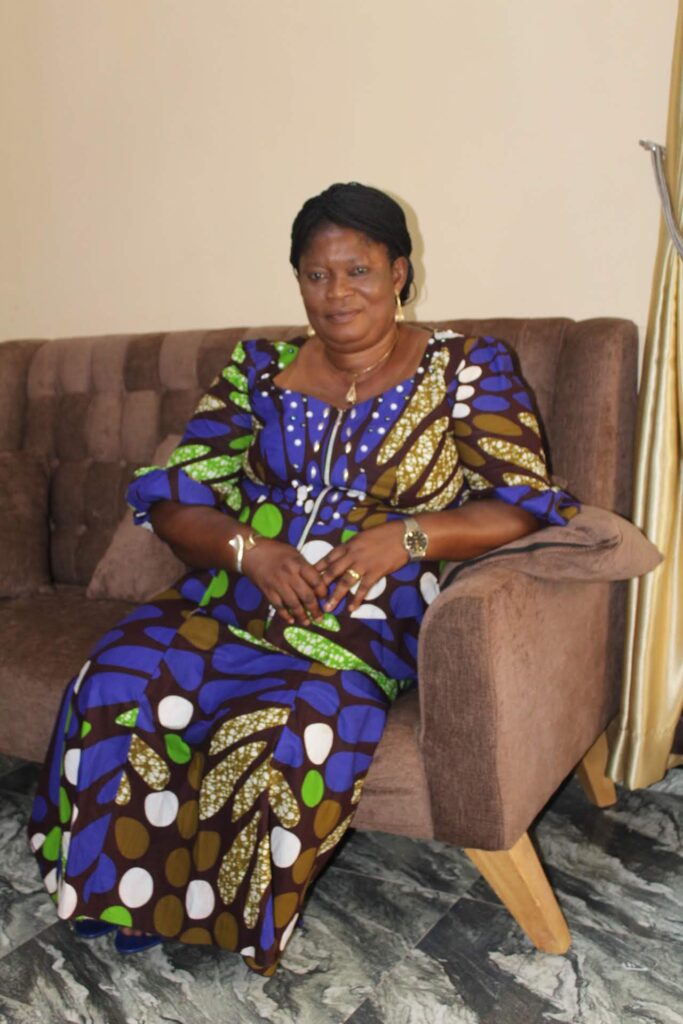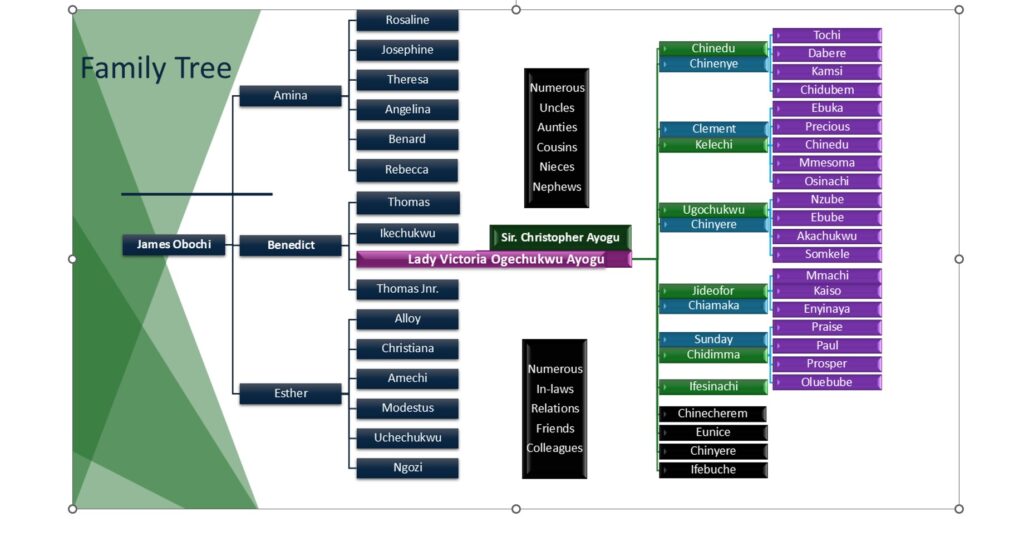Loading….
Biography of Lady Victoria Ogechukwu Ayogu (née Obochi)
Early Life and Family Background:

Lady Victoria Ogechukwu Ayogu was born into the esteemed family of Chief James Obochi of Okpu-Otukwa and Madam Benedict Omada Obochi of Acharagwu Okpuje on 1st October 1960. Her birth heralded the independence of Nigeria from Colonial rule, just as her life has ushered in a string of emancipation and empowerment for all the people who were lucky enough to encounter her. Her parents were known for their strong values, deep faith, and commitment to community service; traits she inherited and enhanced to an enviable level. Growing up in a nurturing environment, Oge was shaped by the teachings of her parents, who instilled in her the importance of faith, integrity, and hard work. Her childhood was a time of learning and growth, laying the foundation for the remarkable woman she would become. Growing up in a large extended family also ensured that she was surrounded by loved ones and reciprocated the love in good measure in her childhood.
It is instructive that her love for her family featured prominently in her life’s journey and loss of loved ones like her father Chief James Obochi, who died when she was in her early twenties, her Mother Benedict, her siblings, Roseline, Josephine, Ikechukwu, Alloy, in-laws like Irene, and cousins like Sunday all took a huge toll on her. Her last wish was to be with her extended family, and she undertook the arduous task, despite the enormous pain she had to bear, of travelling to the village where she shared treasured last moments with all her relations, friends and well-wishers who came for the triple funeral of her brother, sister-in-law, and nephew. It broke her heart to see such an enormous loss in a short period. The chats, hugs, tears and laughter she shared with all those who came to see her are part of the beautiful memories she has returned with as she joined her Creator in Heaven, from where she is smiling down on all of us.
Education: Victoria’s early years were marked by a blend of traditional values and Christian principles. The Obochi family was well-respected in their community, and Victoria was raised with a strong sense of duty and responsibility. Her parents ensured that she received a good education, which was quite progressive for women at the time. This educational foundation, combined with the moral guidance she received at home, helped Victoria develop a strong sense of purpose and direction in life. She was in her time, one of the only few girls who competed favourably against boys for the best grades in her elementary school in Community Primary School, Okpuje from which she graduated in 1975. Her sense of purpose early in life, and dedication to service to humanity, led her to decide that she would be a teacher to raise men and women in learning and character, for the betterment of society. Hence, she proceeded to St. Cyprian’s Teacher Training College in Nsukka where she obtained her Teacher’s Certificate in 1988 before she proceeded to obtain her National Certificate in Education (NCE) from the National Teachers Institute (NTI) Kaduna in 1997. Despite her academic excellence, capacity and opportunity to advance in academics, she sacrificed it in favour of raising a family and indeed, raising a community through her teaching and mentoring of the teaming children and youths of Okpuje Community.
Marriage and Family Life:
As Victoria grew into a young woman, her path led her to Sir Christopher Ugwu Ayogu, a man who shared her values and vision for a life rooted in faith and family. Their union was one of mutual respect, love, and partnership. Together, they built a family that would come to embody the values they both held dear.
Victoria and Christopher were blessed with six children. At the time of her death, the family has grown to include 3 daughters-in-law, 2 sons-in-law and 20 grandchildren. As a mother, Victoria was the heart of her family. She was not only a nurturing figure but also a disciplinarian who believed in the power of prayer, the importance of education, and the vitality of hard work. Her children were raised in a home filled with love, but also with a clear understanding of the expectations placed upon them. Growing up, the children were among the best in their classes, worked hardest on the farm, ate the best foods and dressed in the best clothes; thus, standing out among their peers. It was a family that worked the hardest and played the hardest. Victoria was deeply involved in her children’s upbringing, ensuring that they were well-grounded in both academic pursuits and spiritual growth. Victoria’s role as a mother extended beyond the walls of her home. She was a mother figure to many in her extended family and community. Her home was often a refuge for those in need of guidance, support, or simply a listening ear. Her ability to connect with people of all ages made her a beloved figure in the community. The extra farmwork the family compulsorily undertook placed them in a good economic standing, and thus, fuelled the unabated charitable acts of Ogechukwu; including ensuring that everyone who stepped into the compound had something to eat and drink. Her home is a mecca for children who thronged into the compound at every festival period, assured of a good feast and some cash gifts from De Mama as she is fondly called

Career:
Lady Ayogu heeded her call to service and chose a teaching career early in her life. After completing her Teacher’s Training education in 1988, she waited patiently for the opportunity to come to engage in her passion for teaching. Being raised with the values of hard work and entrepreneurship, she couldn’t just wait idly. She ventured into trade, firstly selling foodstuffs and condiments at popular markets around Okpuje. Then she explored the supply chain of the citrus industry, by buying up orange trees, harvesting and transporting the fruits to Onitsha and other major markets to supply industrial customers. She never relented on any endeavour and kept moving on once the market got saturated. This led her to the storage industry where she would buy up palm oil, and other food staples during harvest, store them up and sell them during festive seasons. She also tried several other businesses, including buying up farms, planting economic plants and trees, and other innovative legitimate ventures to support her family. She was never satisfied with a simple housewife role and made sure her contributions to her family upkeep were prominent.
She became a teacher in 1991, starting as a primary school teacher at Central School Okpuje. Over the next 30 years, she taught numerous pupils in Central School, Community Primary School and Universal Primary Education School, all in Okpuje. Within this period, she rose from a classroom teacher to the highest level available in her career – a Chief Headmistress. She was routinely appraised as an excellent staff. Her relationship with her pupils transcended the four walls of the school and continued through her community-building initiatives.
Lady Victoria’s influence extended far beyond her family. She was a pillar of her community and an active member of the Anglican Church. As a Lady of St. Paul’s in the Anglican Communion Knighthood, she was known for her deep faith, leadership, and dedication to the church’s mission. Her involvement in the church was not just a matter of tradition, but a calling she embraced with all her heart. Victoria’s work in the church was multifaceted. She was involved in various committees, leading initiatives aimed at improving the spiritual and social well-being of her community, especially women. Her leadership was characterized by humility and a servant’s heart, always putting the needs of others before her own. She was known for her ability to bring people together, fostering a sense of unity and purpose within the church and the community.
Beyond her religious duties, Victoria was also a mentor to many young women in her community. She believed in the importance of education and empowerment, and she worked tirelessly to support initiatives that provided opportunities for women and girls. Her efforts were instrumental in creating a more inclusive and supportive environment for the younger generation. Her charitable heart made her distribute bags of rice and other foodstuffs annually to her neighbours and the less privileged in the church and the community. She has also on occasions distributed clothes to the women during Mothering Sunday and shared most of her belongings with others on and off-season.
She was always available to serve her community in any capacity, volunteering for elections duties, census, national orientation and enrollment roles, political campaigns championing people’s interests, and social groups for community integration like Ugomma Cultural group, Inyom di, Women’s guild, Mothers Union, Ladies of St. Paul, St. Peter’s Church Council, Asamuno Group, etc. In each of these services, her excellence stood her out and she was often unanimously adopted as the leader. Her peers referred to her as: ‘Agulu uche onu?’ (translated as: ‘Can her wisdom be quantified?’)
Legacy and Achievements:
Lady Victoria’s life was a testament to the power of faith, love, and service. Her legacy is deeply etched in the lives of those she touched, from her children to the countless individuals she mentored and guided. Her achievements were not measured in material wealth or public recognition, but in the lasting impact she had on her family and community.
One of her most significant achievements was raising a family that has continued to uphold the values she taught them. Her children have gone on to achieve great success in their respective fields, carrying forward the lessons of discipline, hard work, and faith that their mother instilled in them. Victoria’s influence is evident in the lives they lead and the values they espouse.
In addition to her family’s achievements, Victoria’s legacy includes her contributions to the church and her community. She left a lasting impact, particularly in the areas of women’s ministry and community outreach. Her dedication to these causes helped create a more vibrant and connected community that continues to benefit from the foundations she helped build.
Final Years and Passing:
As Victoria entered her later years, her life continued to be marked by the same grace, faith, and devotion that had defined her earlier years. She remained an active member of her church and community, even as her health began to decline. Her final years were spent surrounded by the love and care of her family, who were a constant source of comfort and support.
Victoria’s passing was a profound loss to her family and community. However, her death was not the end of her influence. She left behind a legacy that continues to inspire those who knew her. Her life was a beacon of light, showing the way for others to follow. Her children and grandchildren continue to honour her memory by living out the values she held dear.
Tributes and Remembrance:
The tributes that poured in following Victoria’s passing were a testament to the profound impact she had on those around her. Her children, relatives, friends, and members of her community all spoke of the love, wisdom, and strength that characterized her life. These tributes were not just words of praise, but heartfelt expressions of gratitude for the life of a woman who had given so much to others.
Victoria’s legacy will endure for generations. She is remembered not only for what she did but for who she was—a woman of deep faith, unwavering love, and remarkable strength. Her spirit lives on in the hearts of her loved ones, guiding them and watching over them as they continue their journeys in life.